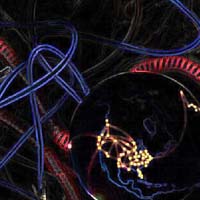The land of bits: metropolitan area networks for information mobility
Abstract
The city is increasingly characterized as a place of relationships, as a exchange site, such as transactional space. There are now widely accepted scenarios that describe future urban concentrations of 75% of human beings on the planet within the urban areas which require a renewed attention to urban phenomena. In this condition the new information and communication technologies play a key-role in the processes of urban transformation and territorial development. The city produces, it processes and transfers information and this seems to be the new good for the urban economy. In order to transfer information (or in some other way to ensure access to it), many large urban concentrations are developing cabled infrastructure through the construction of fiber-optic networks capable of transferring large amounts of information with extremely high speeds. All this will change substantially the profiles of the city by the urban community that will be reached by broadband networks and solicited, by enormous pressures that the market is having on the TLC sector, towards an increased use of computerized flow to perform all activities inside the city. In general we can say, and this study attempts to demonstrate the meaning of that position, that the broadband networks should be one of the structural components of the new "governance" for the city of the XXI century. Furthermore we should not forget the risk of “broadband divide” and, in order to avoid it, we need to promote an inclusive processes of modernization of the city that provide access to the network. In the very next future the prerequisite for territorial development will be strictly connected with the presence of broadband network. Many countries have already understood the strategic role of this infrastructure and have activated specific policies to support their creation. Italy, which is the first places in the world for distribution of devices for mobile phones, seems to show some difficulties in developing the full accomplishment of such infrastructures, but some new political actions seem to start a new season for the digital transformation of the italian territory in a "land of bits". It is now widely accepted that broadbans networks represents a key component for the development of territory. The presence of such infrastructure provides the potential to take part in new and productive economic processes that generate and develop themselves exclusively in the new digital economy. As many researchers have pointed out, for over a decade, broadband networks are an inalienable structure for urban competitiveness and, more generally, a facility which must be installed in all the territorial ambits in which human activities are located. This article try to point out some main issues about the broadband “affaire” in different countries with a special focus on the italian situation.Downloads

Copyright (c) 2014 Tema. Journal of Land Use, Mobility and Environment

This work is licensed under a Creative Commons Attribution 4.0 International License.
Authors who publish in this journal agree to the following:
1. Authors retain the rights to their work and give in to the journal the right of first publication of the work simultaneously licensed under a Creative Commons License - Attribution that allows others to share the work indicating the authorship and the initial publication in this journal.
2. Authors can adhere to other agreements of non-exclusive license for the distribution of the published version of the work (ex. To deposit it in an institutional repository or to publish it in a monography), provided to indicate that the document was first published in this journal.
3. Authors can distribute their work online (ex. In institutional repositories or in their website) prior to and during the submission process, as it can lead to productive exchanges and it can increase the quotations of the published work (See The Effect of Open Access)
